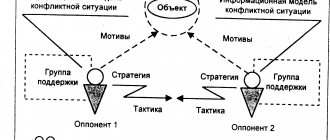The term positive psychology appeared not so long ago and its essence is to deal with existing problems with health, mental health, complexes and other ailments, but, on the contrary, to develop and work on existing advantages.
The basis of positive psychology is that diseases need to be prevented, not treated. It follows from this that by working on one’s potential, one’s advantages, and developing one’s abilities, a person is able to make his life better, prevent many troubles associated with disruption of the body’s vital functions, and even attract wealth, love and happiness into his life.
Story
The founder of positive psychology as an academic field is Martin Seligman,[1] who, when elected president of the American Psychological Association in 1998, dedicated his speech to this new direction of psychology. In his speech, Seligman emphasized that for the previous fifty years, psychology had been concerned with the study and treatment of all kinds of pathologies, without paying attention to the positive aspects of human life, such as creativity, hope, or perseverance in achieving one's goals. Seligman called on his colleagues to "restore the balance" and suggested three main directions for future research:
- positive emotions and subjective feelings of happiness (for example, enjoyment, satisfaction with life, a feeling of closeness, constructive thoughts about yourself and your future, optimism, self-confidence, full of energy, “vitality”);
- positive human character traits (wisdom, love, spirituality, honesty, courage, kindness, creativity, sense of reality, search for meaning, forgiveness, humor, generosity, altruism, empathy, etc.);
- social structures that promote people's happiness and development (democracy, healthy families, free media, healthy workplace environments, healthy local social communities).
Seligman's speech aroused great interest among his colleagues, including such famous psychologists as Christopher Peterson, Ed Diener and Mihaly Csikszentmihalyi, thanks to which the ideas of positive psychology very quickly turned into a new direction in psychological science[ 2].
LIMITATIONS AND PROBLEMS
Positive psychology has gained popularity in the media. This has led some psychologists to express concern. They question whether practical applications of this approach have outpaced scientific research into its effectiveness.
Multimillion-dollar companies such as IBM, FedEx and Adobe have hired “happiness coaches” for their employees. Some schools have incorporated positive psychology concepts into their curriculum. Even the US Army is developing resilience training programs to improve the well-being of all soldiers.
Critics agree that positive psychology can lead to improved mental health in many situations. But the field lacks empirical evidence to support claims of its benefits. More rigorous testing is needed to determine how long the benefits last. Positive psychology has also been criticized for dismissing, denying, or devaluing earlier work closely related to the field.
Image: pixabay.com
One of the potential problems with positive psychology is the possibility of accepting positive statements in extreme cases. For example, some people in treatment believe that by being optimistic they can withstand the effects of serious physical and mental health problems.
The emphasis on personal responsibility may lead some people with mental or emotional disorders to feel responsible for those problems. It is widely known that mental health problems are not the fault of the person experiencing them.
This approach is considered to be less helpful and may not be effective in treating some serious or chronic mental health problems. These may include schizophrenia or traumatic brain injury.
Research has shown that optimism and a positive attitude may not be beneficial for everyone. Some people, what might be called "defensive pessimists," thrive on approaching situations from a negative perspective. It is easier for these people to succeed by first anticipating possible failures. From there they work to avoid failure. Research has shown that this approach can help some people cope with anxiety. It can also help people adapt faster and outperform strategic optimists.
A final criticism of positive psychology is that the approach is somewhat Westernized. It primarily focuses on the virtues and values that reflect the individualism of American society. This limited set of values may not accurately reflect the beliefs of other cultures. For many, a more universal definition of terms may be required.
Main centers
Currently, there are many centers engaged in research and application aspects based on positive psychology. These include, for example, the following:
Center for Positive Psychology
The oldest center for positive psychology (Positive Psychology Center, PPC)[4] is located at the University of Pennsylvania in Philadelphia (USA). The first stage of the center’s work was the creation of a classification of the individual’s strengths and positive traits (similar to the “classification of pathologies”, which is the DSM-IV nosological system). In 2004, Seligman and Peterson published a list of 24 positive human traits, divided into 6 groups[5]:
- Virtues of wisdom and knowledge: creativity, curiosity, openness, love of learning, perspective.
- Virtues of courage: courage, diligence, integrity, vitality.
- Virtues of humanity: love, kindness, social intelligence.
- Virtues of justice: citizenship, fairness, leadership.
- Virtues of temperance: mercy, moderation, foresight, self-control.
- Virtues of Transcendence: Appreciation of beauty, gratitude, hope, sense of humor, spirituality
Seligman and Peterson's list was compiled based on which character traits are most valued in different cultures and religions[5].
Based on this list, the VIA-Survey (en:Values in Action Inventory of Strengths) questionnaire was subsequently created, consisting of 240 questions (this questionnaire is free and available on the Internet [1] (inaccessible link), it is currently translated into 17 languages ).
Based on responses to the VIA-Survey questionnaire, it was revealed which character traits are most conducive to overcoming depression and achieving happiness. These character traits are:
- hope;
- Gratitude;
- curiosity;
- love[6].
The VIA-Survey can be used in psychotherapy by asking clients to evaluate their strengths using the VIA-Survey and then try to use those strengths in a variety of new ways (eg, try a new way every day of the week). It is also recommended to note in your diary each day three happy events that happened that day, and also write down what actions led to these happy events[2].
Center for Applied Positive Psychology
The Center of Applied Positive Psychology (CAPP)[7] is located in the UK. The head of the center is Alex Linley. The main direction of research is the use of the ideas of positive psychology in the professional sphere. The CAPP Center has created the Realise2 questionnaire, which allows you to determine what abilities and character strengths an individual has, as well as to determine the extent to which he uses these strengths in his daily life (the Realise2 questionnaire currently exists only in the English version). CAPP researchers are also developing techniques to maximize the use of an individual's strengths and minimize the negative effects of what are weak or underdeveloped aspects of his or her personality[2].
Gallup Center
This research center was created by the Gallup Institute in the United States of America. Its founder was psychologist Donald O. Clifton. Based on Clifton's ideas, the Strengthsfinder questionnaire was developed at Gallup, 2001), which has now been translated into 24 languages, including Russian (“Discover your strengths”).
"Overcoming Adversity: The Power of Resilience" by Luis Rojas Marcos
Luis Rojas-Marcos is a renowned psychiatrist and researcher. His writings enrich and enable us to reach aspects of psychology that we all need to understand in order to live better lives.
In Overcoming Disaster: The Power of Resilience, we learn how we all, even if we don't believe it, have psychological and biological mechanisms that prepare us to resist and cope with adversity.
In fact, this is what people have done throughout our history because survival is the rule. And we survived thanks to an amazing tool: resilience. In this book we will learn how to work on this, those basic roots which are self-esteem, self-control, optimism and, of course, positive thoughts.
Positive psychology in Russia
The main center of positive psychology in Russia is the National Research University Higher School of Economics.
In 2012 in Moscow on the basis of the National Research University Higher School of Economics and Moscow State University. Lomonosov held the VIth European Congress on Positive Psychology[8].
In 2011, a laboratory of positive psychology and quality of life was created at the Higher School of Economics under the leadership of D. A. Leontyev; in 2014 it transformed into the International Laboratory of Positive Psychology of Personality and Motivation.
In 2020, the master’s program “Positive Psychology” was opened on the basis of this laboratory[9].
“Genuine Happiness”, Martin E.P. Seligman
Martin Seligman, psychologist, author, and director of the psychology department at the University of Pennsylvania, is without a doubt the father of positive psychology. Or at least it's the most famous proponent. It was he who took the first step towards a new perspective in behavioral science. He put aside his study of pathology to focus solely on promoting human well-being.
In his book we will not just find motivational sayings, meaningless chains of beautiful words. There is research in this work, there are contrasting and credible perspectives that will show us how true happiness is born from our human strengths.
Criticism
According to Kirk Schneider, positive psychology cannot explain past negative events, such as the actions of the Nazi Party or Stalin's repressions. In addition, Schneider pointed to research where a positive illusion distorts reality[10]. Positive moods can become incapable of psychological growth and tend to hold onto racial prejudice. Negativity, sometimes manifested as mild to moderate depression, is, in contrast, correlated with less distortion of reality. Therefore, negativity can play an important role in the dynamics of human flourishing[11]. Seligman recognized in his work the view of positive illusion[12].
Ian Sempel in The Guardian, Fr. Sempel quotes Stephen Wolin, a clinical psychiatrist, that positive psychology research is simply a repetition of older ways of thinking, and that there is not much scientific research that can support the effectiveness of this method[13].
Barbara Held has argued that although positive psychology makes contributions to the field of psychology, it has its limitations. She suggested understanding topics such as the negative side effects of positive psychology, the negativity in the positive psychology movement, and the current division in the field of psychology caused by the differing opinions of psychologists about positive psychology. She also raised the issue of the simplistic approach some psychologists take in applying positive psychology[14].
Philosophy of positive change
In order to be happy, you just need to have a positive attitude, and the rest will come by itself - the psychology of positive change is quite simple.
Be in a good mood always and everywhere, believe in yourself and your strength. And so that you have no doubt about the success of your venture, use special words and phrases. We recommend: How to think positively?
An affirmation is a word or a short phrase, the content of which contains a certain positive message, and if you repeat this phrase many times, it will become fixed in your subconscious, creating a certain psychological mindset for success. This is a great option to improve your emotional background and speed up the approach of positive changes in your life. Goal-oriented people often use this method.
How to write an affirmation correctly:
- What you state should sound like a fact, in real time, not in the future.
- You should not use words with negative energy.
- Affirmation words should create an atmosphere of joy and happiness.
- Brevity is the sister of talent; the phrase should not be long.
- Be more specific, don’t use vague language.
- Don't borrow other people's affirmations. Choose or come up with something that is right for you.
- You must sincerely believe in what you say. To maintain overall focus, celebrate your small victories along the way.
Think positively, and soon you will notice that changes for the better will begin to occur around you. Do these exercises regularly. You will begin to notice the beauty around you, you will be delighted by various little things that you seemed to have not even noticed before. Be confident in your abilities, and then all the problems that arise on your way will be within your reach.
Notes
- Seligman M.
Using the New Positive Psychology to Realize Your Potential for Lasting Fulfillment. - New York: Simon and Schuster, 2002. - 275 p. — ISBN 0-7432-2297-0. - ↑ 1 2 3 Forest J. et al.
La psychologie positive et l'approche basée sur les forces: [French]: [arch. February 12, 2013] // Le magazine de l'Ordre des psychologues du Québec. - 2011. - Vol. 28, No. 1 (juillet). - Fredrickson BL
The value of positive emotions // American Scientist, 2003. - Vol. 91. - P. 330-335. - Positive Psychology Center
- ↑ 1 2 Peterson C., Seligman MEP
Character strengths and virtues: A handbook and classification. - Oxford University Press, 2004. - ISBN 0-19-516701-5. - Park N., Peterson C., Selimgan MEP
Strengths of character and well-being // Journal of social and clinical psychology. - Vol. 23. - P. 603-619. - Center of Applied Positive Psychology (unspecified)
(unavailable link). Retrieved November 4, 2012. Archived October 15, 2012. - Press conference dedicated to the opening of the VI European Congress on Positive Psychology (unspecified)
.
medportal.ru
. Copper News (July 27, 2012). Retrieved August 27, 2020. Archived August 27, 2020. - Master's program "Positive Psychology" (undefined)
. Higher School of Economics (2020). Retrieved August 27, 2020. Archived August 27, 2020. - Schneider, K.
Toward a Humanistic Positive Psychology. Existential Analysis: Journal of the Society for Existential Analysis. - 2011. - pp. 32-38. - Barbara L. Fredrickson, Marcial F. Losada.
Positive affect and the complex dynamics of human flourishing // The American Psychologist. - October 2005. - T. 60, issue. 7. - pp. 678-686. — ISSN 0003-066X. - doi:10.1037/0003-066X.60.7.678. - Seligman, Martin E.
The Optimistic Child. Houghton Mifflin Company. - 1995. - P. 295-299. - Sample, Ian
.
How to be happy (English), The Guardian
(19 November 2003). Retrieved July 5, 2020. - Barbara S. Held.
The Negative Side of Positive Psychology
(undefined)
.
Literature
- Compton, William C.
An Introduction to Positive Psychology. Wadsworth Publishing, 2005. - P. 1-22. — ISBN 0-534-64453-8. - Peterson, Christopher; Seligman, Martin EP Character strengths and virtues: A handbook and classification. - Oxford University Press, 2004. - ISBN 0-19-516701-5.
- Style, Charlotte.
Positive psychology. What makes us happy, optimistic and motivated / trans. from English M. Chomakhidze-Doronina; scientific ed. T. Bazarov. - M.: Pretext, 2013. - ISBN 978-5-98995-085-0.
Flow: The Psychology of Optimal Experience by Mihaly Csikszentmihalyi
Talking about positive psychology is also talking about Mihaly Csikszentmihalyi and his work with the “flow state.” His presence on this list is an absolute must and reading this book is extremely enriching.
Of course, we can define flow state in many ways, but the simplest way is to see it as a dimension of gratitude. View it as an "optimal experience" where chaos and anxiety disappear from our minds as we find well-being through a specific task: whatever identifies us, whatever aligns best with us. It is a pleasant state, an epiphany, where you truly find the essence of a happy life.
In this world of endless technological and scientific advances , this book invites us to focus all our psychological energy and attention on specific objects. He invites us to find joy in simple tasks. We must set plans and goals of our choosing on our horizon to experience true well-being.
Links
- Center for Positive Psychology at the University of Pennsylvania
- Oxford Happiness Questionnaire
| Psychology | |
| Sections |
|
| Applied |
|
| Directions |
|
"59 Seconds: Think a Little, Change a Lot" by Richard Wiseman
This is a book you must read. In it, Richard Wiseman, chair of psychology at the University of Hertfordshire, dispels all the classic myths and stereotypes about happiness to open our eyes. In ten chapters, he explores in an original and effective way such aspects as motivation, persuasion, attractiveness, creativity, and emotional well-being.
The most interesting and novel thing about Professor Wiseman's book is that it challenges us to destroy negative ideas and false views in just 59 seconds.
Life inflicts the same tragedies of failure on the optimist as it does on the pessimist, but the optimist survives them better.
Martin Seligman







